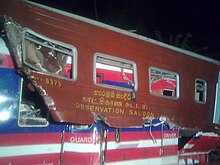| This article needs additional citations for verification. Please help improve this article by adding citations to reliable sources. Unsourced material may be challenged and removed. Find sources: "List of rail accidents in Sri Lanka" – news · newspapers · books · scholar · JSTOR (October 2014) (Learn how and when to remove this message) |
| This list is incomplete; you can help by adding missing items. (September 2014) |
This list of railway accidents in Sri Lanka provides details of significant railway crashes in Sri Lanka involving railway rolling stock.
Other than these, a number of accidents have taken place. One major type is elephant accidents, which typically occur in the North-Central area. Other accidents occur at unsecured level crossings with road traffic.
Worst disasters

The worst disaster was the 2004 Sri Lanka tsunami-rail disaster with more than 1700 people killed by a tsunami following the 2004 Indian Ocean earthquake.
1900s
- 12 March 1928 – A passenger train and a mixed train collided near Kalutara killing 28 people.
- 23 May 1958 – A night mail train derailed at Batticaloa, killing three and injuring several others.
- 18 March 1964 – Sixty people died in a derailment at Mirigama.
- 19 January 1985 – Eleven passengers were killed by an LTTE bomb on a Yal Devi train.
- October 1985 – A freight train from Trincomalee to Colombo was bombed by LTTE. A Class M2 No. 571 locomotive was destroyed.
- 24 July 1996 – Seventy people died after a train was bombed by LTTE at Dehiwala.
- 4 December 1996 – LTTE attacked another train on the Trincomalee Line. Class M6 No. 798 locomotive was destroyed in this incident.
2000s

- 19 August 2001 – A train derailed due to high speed and overcrowding, killing 46 people, between Alawwa and Rambukkana.
- January 2002 – The Intercity Express heading to Colombo from Kandy derails near Rambukkana causing more than 15 deaths. The derailment was due to malfunctioning of the braking system.
- 13 June 2002 – A train derailed while coming into Alawwa railway station, killing 14 people.
- 26 December 2004 – 2004 tsunami rail disaster. At Peraliya, approximately 2685 died in the world's biggest rail disaster as a train is overwhelmed by the tsunami created by the 2004 Indian Ocean earthquake.
- 26 April 2005 – Polgahawela level crossing collision, a private bus driver tries to overtake another bus and the train at a level crossing in Yangalmodara close to Polgahawela crashed. Thirty-seven people died, all on the bus.
- 17 September 2011 – 2011 Alawwa rail accident, near Alawwa railway station, two trains (intercity express train no 1029 Colombo to Kandy and a Class S11 DMU) collided killing five people and injuring over 30 people.
- 17 May 2012 – Two trains collided between the Wandurawa and Keenawala railway stations in Veyangoda.
- 30 April 2014 – An Intercity Express train to north and the Colombo bound Rajarata Rajina train collided at Pothuhera, injuring 68 passengers.
- 5 February 2018 - A train travelling between Colombo and Galle collided with a truck at Angulana, killing four people and seriously injuring two others.
- 28 August 2019 - Two trains travelling between Colombo Fort and Maradana stations (Fort-Chilaw) and (Maradana-Kalutara) collided head on at around 10:20 AM, with no injuries.
- 1 February 2022 - A family of four was killed when their vehicle collided with Rajarata Rajina at Rillamba Junction in Boossa.
See also
References
- "Daily Mirror Online Edition". 26 December 2008.
- "Railway Museum of Sri Lanka". Archived from the original on 13 July 2011. Retrieved 4 April 2011.
- Ramanayake, Wasantha (April 23, 2004). "Bus illegally driven round the end of the level crossing barrier". The Sunday Times (Sri Lanka). Retrieved February 6, 2014.
- "Death toll in Alawwa train accident rises to 5". 18 September 2011.
- "News First". Trains collide in Veyangoda. 18 May 2012.
- "68 injured in train accident". Daily Mirror. Retrieved 2 May 2014.
External links
| Operators/service providers |  | |
|---|---|---|
| By Province | ||
| Lines | ||
| Stations | ||
| Trains | ||
| History | ||